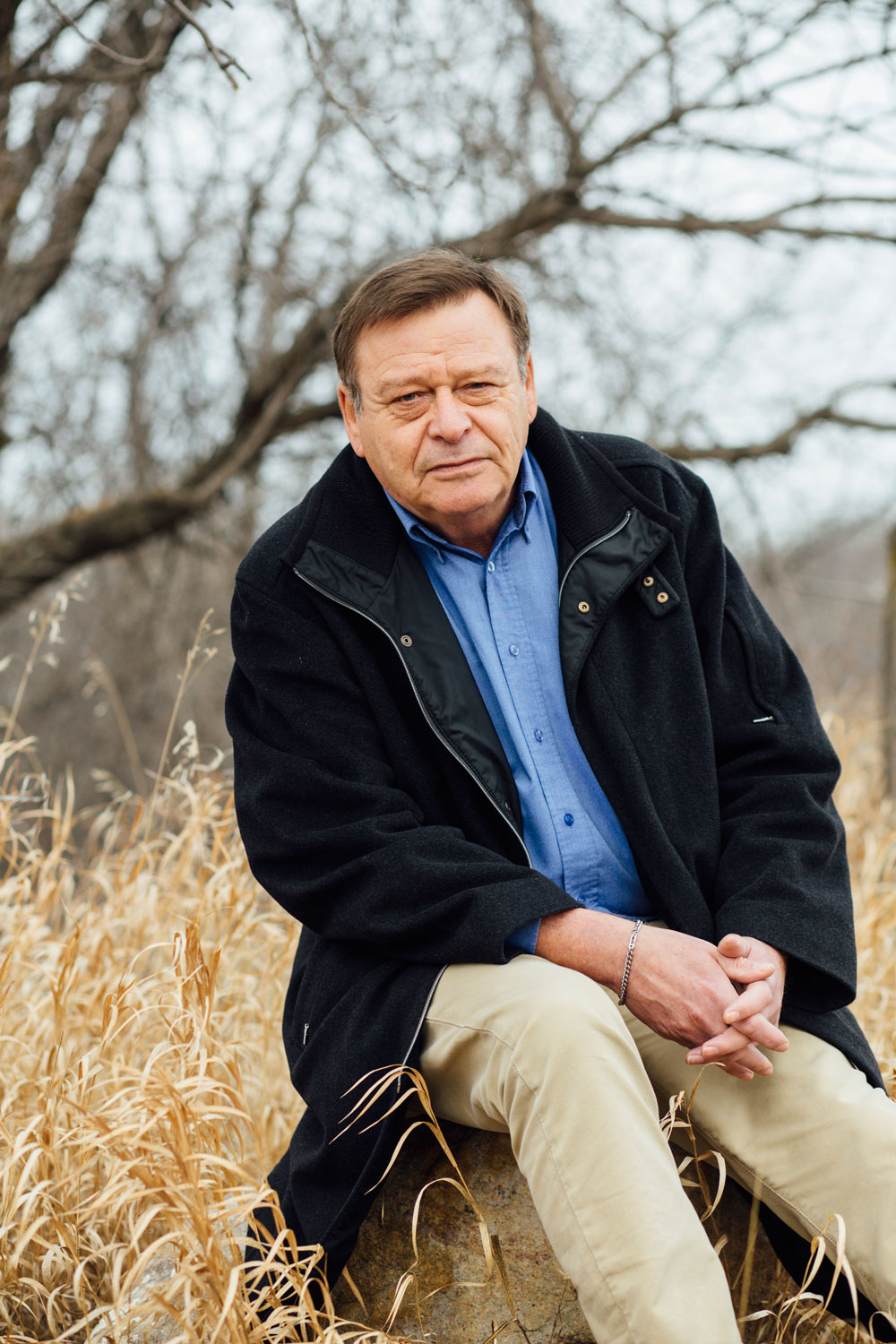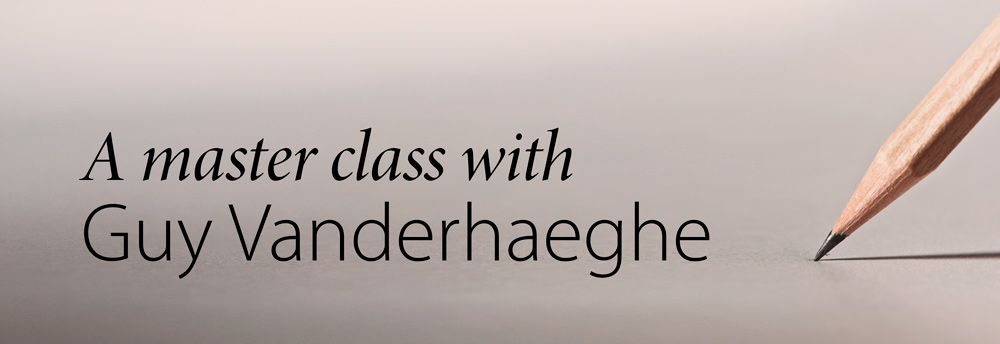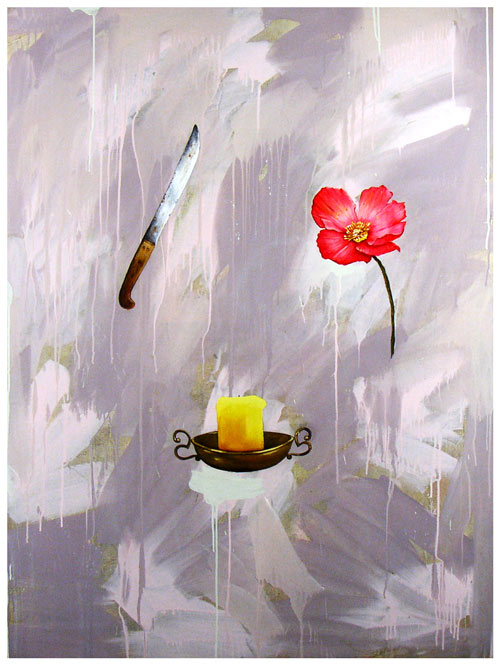Growing up in the mining town of Esterhazy, Sask., Guy Vanderhaeghe (BA’71, Honours ’72, MA’75) never anticipated going to university, let alone achieving international acclaim as a bestselling author. Fate and family intervened on his behalf and he began his studies as a history major in 1968. Today, his trilogy of historical novels set in the 19th-century Canadian and American West—The Englishman’s Boy, The Last Crossing and A Good Man—are read around the world. His ninth book, Daddy Lenin and Other Stories, received the 2015 Governor General’s Award for English-language fiction, making Vanderhaeghe only the fourth person to receive this award three times. The jury hailed him as “a master, a seasoned professional at the top of his game.” In 2009, the College of Arts & Science recognized Vanderhaeghe as one of its alumni of influence. We spoke for two hours at the Diefenbaker Canada Centre on April 8, 2016. A condensed and edited version of the conversation follows.
How old were you when you started writing?
I started attempting to write when I was very, very young… I would have been about six. I would sit on the floor beside my grandmother—she was a seamstress—and I would be attempting to write my little stories. There was no bookstore or library in my town. The school burned down the summer before I started—I didn’t do it—and whatever books there were for children burned with it. So the staple of my reading was the Classics Illustrated comic books. I would attempt to do riffs off of them for my own stories. And in the absence of having a book that told me a story, I would tell myself a story.
Was it for entertainment, or to reinterpret something that happened?
Probably entertainment. I was an only child and when I was very young I lived with my grandparents. There was a movie theatre that showed two movies a week. When the movie was over I would continue the story. I think it was primarily kind of projecting myself into fantasies and partly to figure out the larger world out there.
Many people have the ability to write or draw, but lack the urge to express themselves. Do you see writing as a need or a natural ability?
I think in the beginning writing was an extension of what I experienced. I grew up in a family of storytellers. I often wish that I could tell stories with the timing and polish that my uncles had. They weren’t particularly literate people. My father couldn’t write; he could read a bit but he couldn’t write. Writing stories in the beginning was part of an oral tradition for me and I’ve always felt, particularly in my first book, I never wanted to separate myself too far from the oral storytelling tradition.
One of the things about writing is that narrative makes sense of life. Even though the narratives that we impose on our lives might in some sense be fraudulent or wish fulfillment, we figure out our present from our past. We strip away those things that don’t get us to where we are now. From a very early age I felt compelled to write, but that didn’t mean that writing was a pleasure. It was something that nagged at me all the time. So I’m not sure it was so much to express myself as it was to make some sort of imaginary order out of the world.

In one of the stories in Daddy Lenin, there’s a boy who comes up against stronger, crazier compatriots. Would you say you identified with that boy?
I hung around with kids who were a lot tougher and more inclined to do bad things than I was. I always knew when to stop, before you got into really bad trouble—I wasn’t going to get into a stolen car. At the same time, I didn’t fit in with all the students that the teachers liked. I was an outsider or sort of on the fringe of both groups. When I was really young I did very well in school but by the time I was 12 or 13, I wasn’t doing very well.
Was there a reason for that?
Partly boredom, probably partly whatever was going on in my own life. I started to get tired of school after about seven years. When I say that, I’m not blaming “the system.” It was just my nature. I had difficulty with the arbitrariness of school, of rules. Why this rather than that?
One of the things I had a strong sense of in the Daddy Lenin stories was that there were people who got out and people who didn’t. Did you always want to escape?
I think what I wanted—and I couldn’t have defined it at that time—I wanted to operate in a world where ideas mattered. I had screwed up my high school so badly it did not look like I was going to go to university. In those days you had to have a 65 per cent [average]. But the exams that year were so difficult that it screwed up the bell curve so students who knew nothing—like I knew nothing—we got a boost. I vaulted over the hurdle to go to university with a 65.2 per cent average.
Did both your parents want this for you?
My mother, she was very supportive of me getting an education. My father would have been happy to have me work at the mine and help him farm. I knew I did not want to do that. I wanted to have contact with a world in which someone could help explain the things I was reading on my own to me and it seemed that university was the place for that to happen. So I think the most important thing, aside from childhood and childhood memories, in shaping me was actually going to university.
How did it shape you?
I got interested in learning again. Even though much of what I studied had no “utility” in terms of job training, those were the things that fascinated me: history, philosophy to a certain extent, political philosophy, literature. And just being around people who took those things seriously. I hadn’t been in that kind of milieu before.
Was there something in your upbringing that sparked your interest in the Wild West and prairie history themes?
My father was a cowboy. He worked in professional rodeos. I remember going out on the rodeo circuit with him when I was five and six years old. Our family moved like itinerant crop pickers, from one rodeo to the next rodeo. There were always horses around. And we used to move cattle in the spring and the fall.
I was a great disappointment to him because I didn’t do any of those things particularly well. But I think probably some of the grit in my historical novels that are set in the American and Canadian West comes out of that experience. I was never an expert on horses, but I learned enough so that often people who read the books will say, “How do you know that?” What I know about horses I learned from my father.
Honouring an artist's legacyThe Margaret E. Vanderhaeghe Award in History and Art History
Born in Leader, Saskatchewan, Margaret Vanderhaeghe (1950–2012) was a highly regarded artist who exhibited her paintings nationally and internationally. After earning an Honours BA in history (’71), she married fellow student Guy Vanderhaeghe and went on to become an active and outspoken member of the Saskatchewan arts community as well as a generous mentor to young artists. After Margaret’s death in 2012, her husband established the Margaret E. Vanderhaeghe Award in History and Art History to commemorate her life and work. The prize is awarded annually to an undergraduate majoring in history or art history who shares some of Margaret’s passions. “Margaret was enormously grateful to the institution, as I am, and the education that we got here,” says Vanderhaeghe. “She had an intense interest in visual art and the history of art. She read everything from Da Vinci’s notebooks to Delacroix. She was also interested in history—social history, intellectual history, and later in her life, she read a lot about the history of science. So those were the parameters in my mind for the scholarship.” Above: Margaret Vanderhaeghe, Evidence, acrylic on canvas, 2000. Collection of the Remai Modern. Purchased with assistance from the Canada Council, 2000. |
A lot of your Daddy Lenin characters are facing failure and various disappointments. Yet you yourself are quite successful.
I grew up where you didn’t get praised for much so there was always the sense that you could have done better. Which is one of my great disadvantages as a teacher. I find it very difficult to give wholehearted approval to anything.
My perspective has always been that life is mostly endurance. I’ve always had the sense that that’s the most important thing: to bear up as well as you can in any circumstance. My mother was ill a lot of the time. I spent a lot of time living with relatives. I don’t mean to suggest that people treated me cruelly, but from the time I was about seven or eight years old I knew that life ain’t a bowl of roses.
It changes your outlook when these things happen early on, doesn’t it?
Yeah, there was always tension, right? Like who’s going to take him next? Ok, I’ve had enough of him, it’s your turn now! When I say that, I’m not claiming that my life has been any worse than anybody else’s. The one thing I’ll say is that this sense of disquiet probably may have started a little sooner for me than for other people.
Does this disquiet find its way into your characters as well?
A lot of writing for me is not self-analysis. It’s trying to locate yourself in the world, and because I’ve always felt myself to be a bit of an outsider, that means that the characters I write tend to be outsiders too. Their experiences are not my experiences, but they are also trying to figure themselves out and trying to figure out where they’re positioned in the world.
What is it that sparks the story?
It can be anything: a line of dialogue, something overheard on a bus, an image. Then you play with that. I once wrote a story—I was falling asleep and I don’t know if I was dreaming or if I was in that zone before you start dreaming—I saw a man standing in a dark street singing to a house. So then I had to write a story that explained that [image]. Why was he singing to the house?
Whatever you can’t get out of your head you better do something with. One of the short stories in Daddy Lenin is about a man whose hands inexplicably began to hurt. I didn’t know what that meant and then I had to write a story about it.
People have said about Daddy Lenin that I’m writing from two perspectives: what it was like to be young when I was young and what it is like to be in your middle 60s. The older men in these stories quite frequently are thinking about what got them where they find themselves. And the younger men—outsiders or boys or teenagers—they’re doing the opposite: they’re trying to project themselves into the future. Which goes back to what I said earlier. We tell stories that explain ourselves.
We’ve talked a lot about the men and the boys. Where do the women fit in?
They fit in exactly the way the men fit in Margaret Atwood and Alice Munro stories.
It sounds as if you’ve been asked that before.
Men writing about women are often chastised for writing about women because they’re either appropriating a voice or a position that they don’t understand. But if the women aren’t foregrounded, then [male writers are] criticized for not foregrounding them. I make no claims to be able to occupy a woman’s perspective. The only claim I can make is to locate women in men’s lives. Or at least in the lives of my characters, which I would say is exactly what most female writers do.
Does writing hold things together for you? Do you have to follow a certain process to keep things going?
It doesn’t necessarily get easier—but one thing that I found out is that I actually discover what I want to say by attempting to write it. It’s only in writing that I discover what I actually think. It’s like Bill Kinsella’s line: “If we build it, they will come.” You just try and start building it and have some sort of faith that you will arrive where you need to be. But you only arrive at where you need to be by working damn hard at it.

Is that something that you tell your students?
Oh, all the time, but students never believe that. Most “creative people” when they’re young tend to think everything is inspiration. And if the divine afflatus doesn’t come down and strike them and fill them with some sort of passionate reverie, then it’s kind of pointless.
How I taught myself to write was by reading. So when I teach, I try to teach craft, because craft is difficult to learn. A painter has to know at the simplest level how to mix paint or how to size a canvas but people somehow think there aren’t tools [for writers] to control the material you are working with. You become a better writer by reading literature. You’re learning but you’re also aspiring. That’s why everything I’ve written in my mind is a failure. I have a sense of what the real standards are. It doesn’t mean you stop doing it because it didn’t get you absolutely where you want to be—but without some sort of aspiration it doesn’t go anywhere.
I tell my students that way back when I was going to university there were three of us that confessed the dirty little secret that we would like to be writers. The other two were way more talented than I was. I was more dogged than they were.
What are they doing now? Are they lawyers?
One is a consultant. (Laughter)
 |
|
Tips from a master craftsman After more than 20 years as a visiting professor of English at St. Thomas More College at the U of S, Guy Vanderhaeghe was recently named the St. Thomas More scholar. He focuses on teaching the craft of writing to his students—a number of whom have gone on to successful careers of their own. “If you learn these things,” says Vanderhaeghe, “at least you’ve got the tools to attempt to tell a story.”
|
You obviously had a gift for writing and telling stories. Did you write a lot of bad ones?
(Lots of laughter) Of course I have! I don’t know who said it but it’s one of my favourite lines: “Dreams are failed art.” Which means dreams lack coherence. A lot of artists assume that what they produce will have the same effect on other people as it has on them. But for it to have an effect it has to have a coherence of vision, or a coherence of form or a coherence of perspective.
Only peripherally is fiction about real life. Fiction is the illusion of a record of real life. Because otherwise fiction would be incredibly boring.
Has your work changed as you age?
One of the things that happens with age is you find yourself looking backward more than you’re looking forward. The one great thing about being a younger writer is that first books are usually full of pent-up energy. All of this stuff, you’re just getting it off your chest and it’s all just there—pooosh, shot out of the cannon.
As you get older, you have to rely more on craft. The work is less likely to be as strong and as vigorous and as fresh as it obviously is when you’re really young. I sometimes use the analogy of an aging athlete. They have to rely on what they know more than what their bodies can do.
What is next for you? More short stories?
I’m working on a novel right now. The reality now is that publishers publish a collection of short stories as a favour to a writer. It’s a fact that short story collections don’t sell. Or they don’t sell very well. My agent doesn’t say, “Whoopee, Guy’s written a collection of short stories!” It’s a crueller world than when I started.
How long does a novel take you to write? Is it years?
With me it’s years. I’m a very slow writer.
Do you like teaching?
I don’t like to teach a lot, but I like teaching. Over the years because I’ve been doing it for so long, I’ve had a number of people who have published books and gotten a certain measure of attention. That makes me feel good. And every once in a while I get an email out of the blue from some student who says, “I didn’t understand what you were saying when you were teaching me, but I can see some of those things you were emphasizing now that I’ve got more experience.” Another student said to me, “Thank you for being so encouraging and demoralizing.”
